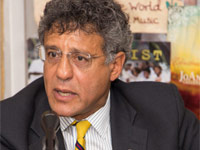NASSAU, The Bahamas — Minister of State for Lands and Local Government the Hon Byran Woodside is holding consultations with the Bahamian public throughout the country on the Land Adjudication Bill 2010.
During a recent town meeting at the British Colonial Hilton Mr Woodside explained that the good and marketable title to land are essential to economic empowerment, that is why the Government is placing before the public, a Land Adjudication Bill, which will permit the certification of free simple title to generation lands.
Also, legislation will be put before the public for a Law of Property Act and for a Registration Land Act.
Mr Woodside said he is acutely aware that land remains a major issue for many Bahamians and the Government wishes the public to take advantage of the opportunity to participate in creating a legal framework for ownership and registration of land in The Bahamas, including but not limited to generational land.
Generation land is a form of common property, where several claimants hold undivided interests in the property, he explained.
“They derive their interests from claims of inheritance from a single ancestor, although without the legally prescribed procedures for administering the estates of deceased ancestors for generation after generation,” Mr Woodside said.
There are several challenges to land administration, which include: no marketable title for generation land; multiple owners claiming the same land; high proportion of land disputes; unscrupulous lawyers, and realtors; holding of land for speculative purposes; lack of surveys for many land parcels; prohibitive cost; need for banking transparency; search by name and not by title; notice only given in the Gazette; and outdated laws and land reform needed.
Mr Woodside said the object of the Bill is to provide a legal framework to enable families who have been in possession for 12 years or more of a parcel of land of not more than one and a quarter acre to claim ownership of such land and if successful to be granted a certificate of title for the land.
He said told those present at the town meeting that the Bill provides for the appointment of a special Adjudication Officer, who has the qualification of a Supreme Court Judge, to ascertain and record titles throughout an adjudication area to which the Act has been applied.
The Bill also sets out the procedure to be followed by the Adjudication officer and defines his or her duties.
“Adjudication Officer will prepare notices in respect of an area which notice will declare that all interest in land claimed under the provisions of the Act will be ascertained and recorded,” Mr Woodside said.
“The notice will be published in the Gazette and in public offices and in such other manner as the Adjudication Officer sees fit in order to bring it to the attention of all persons in The Bahamas.
“Any persons who claims an interest in land in the area will be required to make a claim in person or by an agent,” he said.
All other claims for land title is stayed unless the Adjudication Officer gives consent to proceed in writing, including applications made under The Quieting Title Act 1959.
The Bill also specifies the principles to be followed in preparing the adjudication record and form of the record, and provides for the issue of a certificate when the record is complete, Mr Woodside noted.
Also, the Bill provides for the making of objections and for hearing of the same, corrections of the adjudication record and its publication after 60 days from the publication of the notice of completion or the determination of any objections, he said.
The record is final and not subjected to appeal, Mr Woodside stressed.
The public can read the Bill at the Government’s Website, under Bills, Laws and Acts and Under Drafted, New and Amended.
By Llonella Gilbert
Bahamas Information Services



